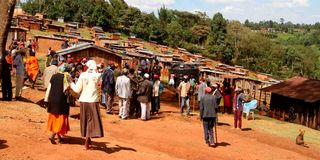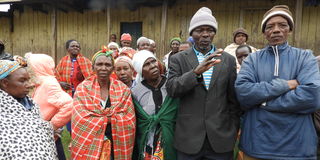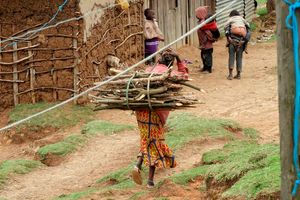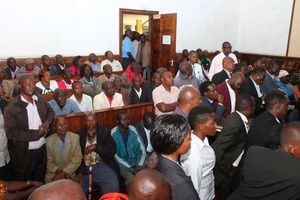
Mau Forest evictees at one of the internally displaced persons' camp at Saptet on January 10, 2022.
Thousands of Kenyans who were evicted from Mau Forest in 2019 are still searching for shelter, with most of them living temporarily with friends or renting houses as they wait for the government to provide new homes.
This is even as corruption allegations emerge during the listing of beneficiaries.
One man confessed to Nation that he was not displaced from his home but received money as “thank you” because he helped a politician to be elected during the polls.
Only a few genuine people who were evicted have received compensation. The majority who have not got a single cent are now seeking to return to the forest.
Nominated member of the Narok County Assembly Jefferson Langat was part of the committee responsible for listing the evicted people.
He told Nation that the eviction, which affected more than 13,000 people, was politically motivated.
“I was born and raised in the area known as Mau Forest. Many people lost their property and most have not been compensated. Out of the 13,500 evictees, only 2,000 have been resettled,” said Mr Langat.
The 2,000 evictees were from the Ololunga, Melelo, Sogoo and Segemian wards in Narok South Constituency, areas originally occupied by the Ogiek and Kipsigis communities.
The reason these 2,000 were resettled last year was due to concerns from the national and county governments that the heavy rains at the time would affect those still living in temporary camps.
“President William Ruto allocated Sh600 million ... This money was used to compensate 2,000 people in the camps. The rest, who were listed in phases two and three, are yet to receive anything,” Mr Langat said.

Mr Joseph Sigilai, the vice chairman of families evicted from Mau forest who are camping at Olmekenyu Hillside IDP camp in Narok South speakign to the Nation in this photo taken on June, 28, 2022
Ms Zipporah Langat, who was among the people who lived in the camps, told Nation that they received a three-month notice to vacate the forest.
“After the three months, police officers came to evict us from our homes. My husband and I were trying to remove maize from our granary, but the granary and our house were burnt down,” she recounted.
With no place to go, she was directed to the camp. During the registration for the Sh299,000 grant, Ms Langat was hopeful that her family would finally have a place to settle.
However, she said, the list kept changing. By the fourth revision, both her name and her husband’s were missing.
“Corruption was rampant during the listing process. Our names were replaced with those of people who had paid Sh50,000 or Sh100,000 but were not real victims,” she said.
After three months, those who had opened bank accounts received the money and were required to leave the camp.
“The government didn’t want anyone to remain in the camp. My family and I had to leave. We were hosted by a friend here in Kamwengoi,” Ms Langat said.
The mother of five now lives in a small room that serves multiple roles.
“I stay in this one room with my husband and our five children. During the day it’s used for cooking. In the evening, we rearrange everything to create a sleeping space,” she explained.
“This life is difficult. I beg the government to let us return to Mau. Sometimes, my husband and I are forced to sleep outside because our children are now grown and the space is limited,” she said, tearing up.
Just 200 metres away, Nation met another family that had been moved from one farm to another as landowners returned to reclaim their property.
A weary Esther Kemboi expressed fear about being evicted again with her seven children.
“I don’t understand why I registered and opened a bank account yet we never received any money. I don’t know when the landowner will kick me out again,” she lamented.

Some of the Mau Forest evictees ponder their next move on July 2, 2020. PHOTO |FRANCIS MUREITHI | NATION MEDIA GROUP
The family, like many others in the area, had opened bank accounts under the assumption that financial support would follow. But the funds never came.
Nation confirmed that the list of beneficiaries included close associates of local leaders who were not genuine victims.
A man referred to as P.K.T admitted that he got money due to his close ties with politicians. He said that he received a call from the people registering names and was asked to provide his ID and bank account number to benefit from the funds.
“I was going about my usual business when I received a call. It was a politician who asked me to share my full name, ID number, and bank account details,” he said.
“Three months later, I received the money. I wasn’t an actual victim, but it was a token of appreciation from the politician because I helped him during his campaign and helped him get the seat he was contesting for,” P.K.T added.
Claims that non-victims received the money were dismissed by Mr Langat, who said those from Ololunga ward who didn’t receive the funds were instead taken to land bought by Narok leaders.
“After the money came in, many people left the land we had purchased as leaders. Those who couldn’t afford to rent houses and were listed in the second phase were allowed to live there. They are among the 11,000 who have not received anything,” Mr Langat said.
He explained that those who missed out in the second phase were mostly individuals without national ID cards.
“In my ward alone, there are 13 people who don’t have any identification documents. Some opened accounts under their relatives’ names. For example, a woman opened an account under her husband or brother’s name, and later claimed the man disappeared with her money,” he added.
He urged the government to allow the victims to return to the areas they came from, saying the land was not part of the Mau Forest.
“You know, even if you are given Sh300,000 and lose a house worth Sh3 million, it doesn’t solve anything. The land they lived on was trust land, not inside Mau Forest. After they left, that’s when it was declared part of Mau Forest in the newspapers. The President should reopen the area and allow people to go back because they had valid documents,” he concluded.
During our investigations, we encountered several octogenarians who, despite confirming their grants with their respective financial institutions such as Imarisha Sacco, were unable to access the funds. According to one bank manager, the issue stemmed from name discrepancies during registration, even though these individuals appeared on the original list of evictees.










